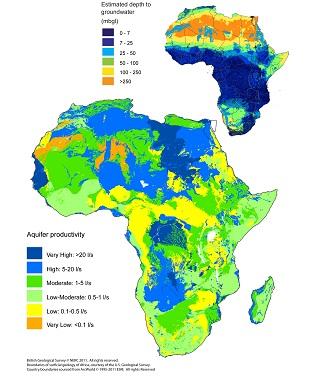The state of smart cities in MENA
11 December 2025
Published online 12 May 2012

Africa sits on huge underground water reserves which contain 100 times the amount of fresh water resources on the surface, according to a new comprehensive map.
A team of researchers from University College London collected hundreds of geological maps and aquifer data and combined and georeferenced them to create a comprehensive picture.
There were many previous attempts to determine the amount of groundwater in Africa, "but this is the first time that the data and maps have all been put together to give a quantitative estimate of available groundwater and potential borehole yields," says Alan MacDonald, principal hydrogeologist at the British Geological Survey and the project's lead researcher.
The largest underground water reserves are found in the drier North Africa region, especially in Egypt, Libya, Sudan and Algeria.
Much of the water in this region is located deep underground, 100 – 250 m below the surface. MacDonald warns this inaccessibility might make it almost impossible to use the reserves for irrigation or to provide drinking water for new urban centres across the continent.
"A community borehole which is 50m deep equipped with a hand pump costs around US$6,000," he says. This rises to US$20,000 for a 150m deep borehole. "The deeper large aquifers found in North Africa require even deeper boreholes which can cost in excess of US$100,000." Additionally, such boreholes require ongoing maintenance to ensure longevity.
"This map will be very useful," says Ahmed Awad, a geologist at the ministry of environment in Egypt. He hopes that a clearer view of the location of underground water aquifers will decrease conflicts and allow successful co-projects between states "which require expertise and technology transfer."
"A regional project to tap into these groundwater aquifers in North Africa will need a huge budget of around US$15 billion," he adds.
The study estimates the amount of underground water but does not determine its quality. Contaminants such as fluoride, arsenic and other undesirable natural parameters such as faecal coliforms and nitrates due to on-site sanitation and leaking sewer may make the water unusable.
"To give a meaningful assessment of groundwater quality across Africa is a large task, and will require systematic sampling country by country," said MacDonald. "This will require significant funding for several years, and a large partnership across Africa. It would be a great project, but currently we have no funds to do this."
doi:10.1038/nmiddleeast.2012.72
Stay connected: